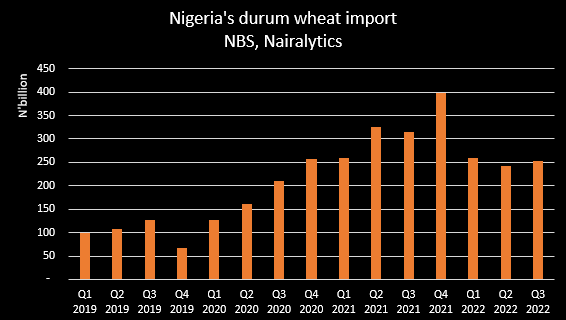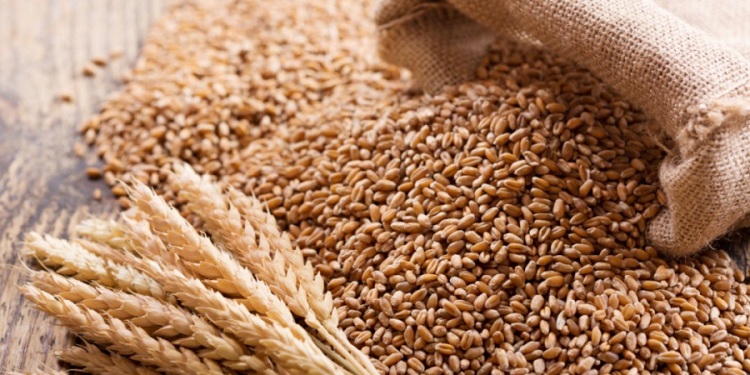Nigeria imported durum wheat worth N753.6 billion in the first nine months of 2022, a 16.1% decline compared to N898.2 billion worth of durum wheat importation during the comparable period in 2021.
This is according to data gathered from Nigeria’s international trade reports, released by the National Bureau of Statistics (NBS).
Note that in the full year 2021, Nigeria imported wheat worth N1.29 trillion. Meanwhile, it appears 2022 numbers will fall short of the previous year’s import despite increased population/demand.
Some details to note: The decline in Nigeria’s wheat import may be attributed to the continuous confrontation between Russia and Ukraine since February 2022, as most of Nigeria’s wheat import comes from these two countries.
- The decline in Nigeria’s wheat import is of particular interest considering how much Nigerians consume wheat. Notably, wheat is the third most widely consumed gain in the country. It is used in the production of bread, livestock feeds amongst others. The CBN said:
- “Wheat is the third most widely consumed grain in Nigeria after maize and rice. It is estimated that the country only produces about 1% (63,000 metric tons) of the 5-6 million metric tons of the commodity consumed annually in Nigeria. This enormous demand-supply gap is bridged with over $2 billion spent annually on wheat importation. This has made wheat the second highest contributor to the country’s food import bill.”
However, despite this enormous demand for wheat in the country, its import has dropped in the past nine months, especially at a time when the nation’s agricultural import surged to N512.91 billion in Q3 2022 and N1.42 trillion between January and September 2022.

Nigeria-Russia trade: Nairametrics reported earlier in the year that Nigeria’s $2 billion annual trade with Russia could be impacted by the war, following sanctions placed by other western economies on the country.
- Russia, which plays a very important role in international trade has been in a confrontation with neighbour Ukraine over the past 10 months, after Vladimir Putin, the President ordered the invasion of his troops into Ukrainian territories.
- This has had ripple effects on the global economy, leading to high energy prices, food inflation, and uncertainties across major economies of the world, with Nigeria, not excluded from the list.
- In addition, Russia which is a regular on the list of Nigeria’s international trading partners has fallen off the list in recent times. A cursory analysis of the data from the NBS showed that Nigeria imported goods worth N813.19 billion between January and September 2021.
- However, in 2022, Russia failed to make the list of top import sources for Nigeria. Meanwhile, a further perusal of the NBS report showed Nigeria imported frozen seafood worth N1.19 billion in Q3 2022 and sulphur valued at N517.9 million in the same period.
Silver lining: The recent development could be an opportunity for Nigeria to improve its local production to meet the demand gap in the country and save itself a massive $2 billion in massive import bill payments for the importation of wheat.
- The Central Bank earlier in the year noted that it was increasing funds to stimulate wheat growing in the country in a bid to redirect cash from imported goods following the surge in the price of wheat in the global market.
- “In the light of the circumstances faced in wheat cultivation in Nigeria, the bank through its flagship Anchor Borrower Programme, in 2020, commenced a strategic approach targeted at facilitating import substitution by promoting self-sufficiency in the wheat value chain,” the CBN governor, represented by Hajiya Sa’adatu Ibrahim, the CBN Controller, Dutse Branch stated at 2021/2022 Brown Revolution Field Day/Harvest in Jigawa State earlier in the year.
- According to the apex bank, it had also educated over 250 extension workers with a total reach of over 120,000 farmers in order to use the GAP to spread knowledge to farmers in their particular areas.
- So far, the CBN has disbursed a cumulative N1.07 trillion to over 4.6 million smallholder farmers cultivating 21 commodities across the country under the Anchor Borrowers’ Programme (ABP).
- Similarly, under the Commercial Agriculture Credit Scheme (CACS) the CBN has also disbursed a cumulative N745.31 billion to finance 680 large-scale agricultural projects.
In other news: Nigeria recorded a total foreign trade of N11.59 trillion in the third quarter of 2022, representing a 9.7% decline compared to N12.84 trillion recorded in Q2 2022, largely due to the 21.2% drop in Nigeria’s crude oil export.
- Imports increased by 4.2% quarter-on-quarter to N5.66 trillion compared to N5.44 trillion recorded in Q2 2022, while it increased by 6.2% from N5.34 trillion recorded in the corresponding period of 2021.
- Trade balance, which is the difference between export and import fell to N269.3 billion in the review quarter, representing an 86.3% decline compared to N1.97 trillion recorded in the previous quarter.
















